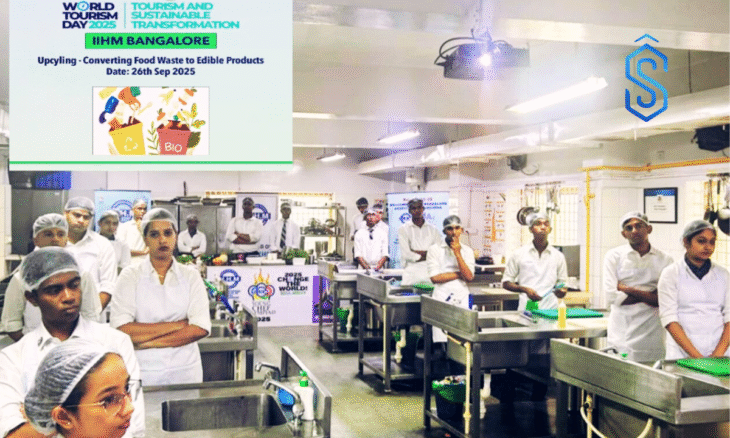Bengaluru: IIHM Bangalore has taken a major step in promoting sustainable culinary practices by hosting a food waste recycling initiative that transformed discarded ingredients into innovative dishes.
The program not only aligned with Sustainable Development Goals (SDGs) but also emphasized the growing importance of eco-friendly approaches in the hospitality industry.
The initiative showcased creative culinary methods that repurposed typically discarded items such as onion peels, jamun seeds, pineapple peels, watermelon rinds, pumpkin seeds, and cucumber peels.
Also Read: IIHM Young Chef India 2025: Student Chefs Compete for Chance to Represent India at YCO 2026
Through techniques like drying, powdering, and reintegration into recipes, these ingredients were converted into desserts, starters, and main-course accompaniments.
Director of IIHM Bangalore, Sanchari Chowdhury, highlighted the value of this effort: “Recycling food waste not only reduces waste but also adds innovation and respect for ingredients. Sustainability is not a trend, but a responsibility for all future chefs and hospitality leaders.”
Students Innovate with Sustainable Culinary Practices
The initiative included a sustainability education competition, where 20 student participants were challenged to create dishes using recycled food items within 90 minutes. Faculty members, including Chef Vijaitha, guided the process and emphasized food safety:
“All peels and seeds are air-dried or cooked before reuse, ensuring hygiene while exploring new flavors and textures,” she explained.
Sustainable Culinary Practices: Broader Eco-Friendly Initiatives in Hospitality
Alongside food recycling, the event spotlighted wider eco-friendly measures such as reducing plastic usage and adopting paper or jute alternatives to cling wraps. These practices mirror global hospitality trends where sustainability and recycling are increasingly prioritized.
Also Read: Bengaluru: IIHM Student Nandini Nair Selected for Scot Malt Tour 2025 in Scotland
One participating student noted: “This competition showed me how creativity and responsibility can go hand in hand. Using food scraps to make flavorful dishes taught me that small changes in the kitchen can create a big environmental impact.”
Building a Sustainable Future in Culinary Education
By fostering awareness among young chefs, IIHM Bangalore continues to lead efforts in embedding sustainable culinary practices into its curriculum.
The institution’s approach demonstrates that innovation, responsibility, and environmental stewardship can seamlessly coexist in shaping the future of hospitality.










